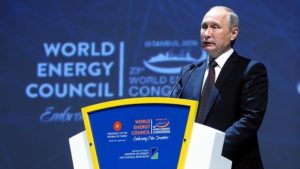Russia Supports Efforts to Cut Oil Output
 Russia supports efforts to limit oil production and urges other exporters and producers to do the same, Russian President Vladimir Putin said on Monday.
Russia supports efforts to limit oil production and urges other exporters and producers to do the same, Russian President Vladimir Putin said on Monday.
Speaking at the World Energy Congress, of which Anadolu Agency is the global communication partner for 2016, Putin said that they support OPEC’s decision to limit oil production.
“We support recent OPEC’s initiative aimed at limiting oil production and we expect that at the OPEC meeting in November this idea will be presented in such a way to send a positive message to the markets and investors,” he said.
“Of course this decision will help curb the speculative activity and avoid new price fluctuation,” he added.
He urged, “not only producers and exporters, but consumers should also act in a responsible way. Energy security can be safeguarded if we pay attention to others’ interests. We stand for firm compliance with the principals of free trade and fair play.”
Russia, a large energy power, has always contributed to long terms and sustainable development, according to Putin.
Speaking on Russia’s energy future, Putin said that Russia has been boosting exploration of new deposits and is continuing to invest in exploration.
“There should be no doubt that our country will continue to be a viable energy supplier in global markets,” he stressed.
He explained that in talks with Turkish President Recep Tayyip Erdogan, the need to develop the Turkish Stream natural gas project has been indicated and he added that Russia also plans to actively expand hydrocarbon exports eastward to China, Japan and India.
“Russia will further interact in energy with all interested parties for mutual beneficial partnerships on an equal footing,” Putin added.
Putin asserted that contrary to the idea of the age of hydrocarbons coming to a close, he said that although the world hydrocarbon resources have undergone major changes, he believes that “there are no real grounds behind such far reaching conclusions, at least as of now.”
However, he recognized that the demand for renewable energy is growing exponentially compared to traditional energy sources with technological advancements leading to a speeding up of this process.
“At the same time oil and gas consumption continues to increase although at a slower rate than before,” he said.
In response to the reasons behind the oversupply of hydrocarbons, Putin said, “high oil prices over the last years have led to unprecedented investments in the energy field. Production of hard-to-recover oil together with facilitated access to financing led to the development of new producers. As a result, a number of importing countries have built up their production capability, and the market was faced with significant oil overproduction.”
Reduction or freezing oil production is the only way to preserve sustainability of the entire energy sector, he said and added, “It will not impede the work of the market’s mechanisms by far, but on the contrary will speed up market rebalancing.”
The energy picture is changing slightly. The large-scale growth of LNG production leads to the fact that for the first time in history of gas markets the market is beginning to become truly global and the world’s infrastructure is expanding, he said.
According to the outlook for LNG trade, volumes will exceed traditional gas transportation via pipelines and the purchasing power of LNG will expand even further, he said.
“According to International Energy Agency (IEA) data, the world will continue to be based on hydrocarbons and oil and gas demand will continue. By 2040 the share of oil in global energy consumption will be 26 percent, coal at 25 percent, gas with 24 percent, biomass and biofuel at 10 percent, nuclear at 7 percent, hydro 3 percent and 5 percent for other renewables.”
“Naturally it is a mid term outlook but it sets certain guidelines for us,” he said.


